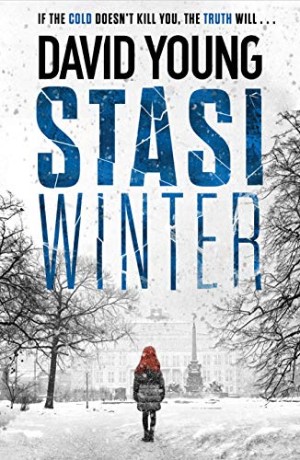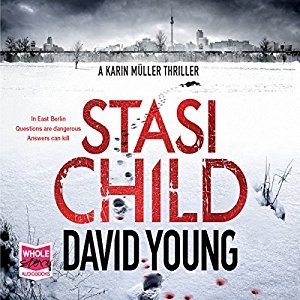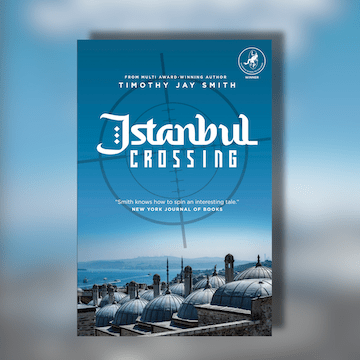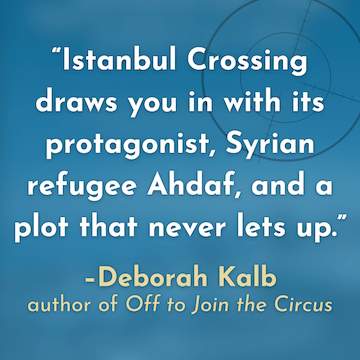
David Young’s debut novel, Stasi Child, won the CWA Historical Dagger when it was published in 2016. Since then, his Stasi novels have been sold in 11 territories around the world. They feature Karin Müller, a detective in the People’s Police in East Germany and are crime thrillers that also highlight the challenges and compromises of living and working under a totalitarian regime. Before becoming a full-time author David was a senior journalist with the BBC’s international radio and TV newsrooms for more than 25 years. The fifth novel in the series, Stasi Winter, is out on 9 January.
What are crime fiction lovers going to love about Stasi Winter?
I hope like all my novels if offers something a bit different – a taste of a lost world. It also sees the return of the ‘Stasi Child’ from my first novel of the same name – four years older, but not necessarily any wiser. Compared to my other stories this is much more of a thriller and my main character, People’s Police detective Karin Müller, finds herself in her tightest spot yet.
When you started the first Stasi novel, did you intend to write a series or did the idea emerge later?
My plan was always to write a series. In fact, I was hoping to write a book per year from the time the first novel is set (1975) until the fall of the Wall in 1989. My publishers looked a little aghast when they realised that was 15 or so books. We’ve reached the winter of 78/79 in Stasi Winter.

What made you choose to write about East Germany?
I was interested in doing a slightly different take on the communist detective trying to solve crime whilst not falling foul of the secret service kind of thing. In many ways, East Germany was the most interesting of the Warsaw Pact countries in that the people were always German first, and they enjoyed the highest standards of living in the Soviet bloc. The contrast between East and West was particularly in the spotlight because of a divided Berlin.
How do you go about researching your books?
I’ll try to do at least a couple of research trips to the now united Germany for each novel. But the internet is also a great research tool. My German is very basic (despite attempts to improve it) so Google Translate gets used a lot for memoirs etc that are only published in German.
How does research fit into your writing process?
I tend to write in splurges – so I might finish a first draft in a couple of months. That will throw up some questions which need checking or research after the words are on the page. But the fact that I write a lot in short bursts (as opposed to every day like many authors) leaves plenty of time for research.
You write vividly about the cold in Stasi Winter. How does the setting influence you when you develop your stories?
I think it’s key, it’s like another character. In Stasi Winter, that’s particularly the case – ice and snow are at the heart of the story. For reasons that will become clear, this novel had to be set on the coast. I also wanted to bring back the character of Irma Behrendt from Stasi Child so it meant a return to her home island of Rügen on the Baltic Coast.

Your protagonist, Karin Müller, is a major in the police. How does her experience reflect working life for women in East Germany?
Women did enjoy a much greater role in working life in East Germany than in the West at the time I’m writing – there was a far higher percentage of women in work. However, Müller’s senior role is a fiction. At the time the series starts, I don’t think there were any female heads of murder squads in the GDR. But there were plenty of female detectives – probably proportionately more than in the West. Equality only went so far though. Except on 8 March (International Women’s Day), they ended up doing the housework as well as their own jobs.
What are the challenges of fictionalising real events? How do you manage the trade-off between drama and accuracy?
I try to keep what I regard as a framework of authenticity but within that most of my stories are fictional. Some authors write historical fiction which is a fictionalisation of true history, but my novels aren’t really like that (the exception is the first-person narrative of my last novel, Stasi 77, which was very much a fictionalisation of real events – in that case the experience of a French forced labourer who endured a ‘death march’ towards the end of World War II). I maintain the same approach in Stasi Winter. So I allow myself plenty of authorial license. In the latest story, I’ve ‘borrowed’ aspects of the winter of 62/63 and transposed them to 78/79, although 78/79 was still an exceptional winter.
This is the last Stasi novel. How does it feel to come to the end?
It was the last novel in my current contract… but it might not be the last, you’ll have to wait and see. There may be some news soon to contradict the above statement!
What do you plan to do next?
I’m working on a number of writing projects. Something set in Dresden, something set in Hull and something set in Greece. Plus, I already have another series underway written under a ‘secret’ pseudonym. So that’s quite enough to be getting on with …
Also see our review of Stasi Wolf













Really looking forward to Stasi Winter. Genuinely hope this isn’t the last Stasi novel – ten years to go surely?